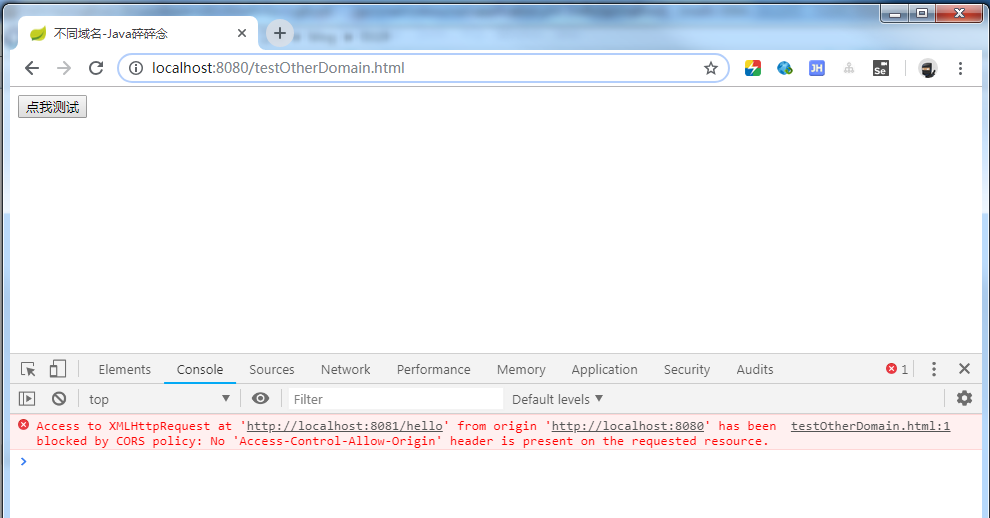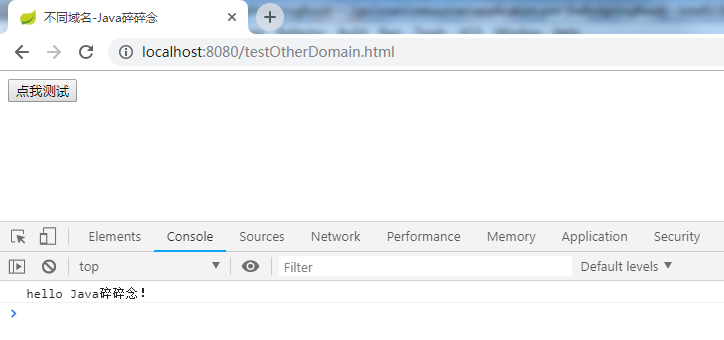Spring Boot 2.X 如何优雅的解决跨域问题?
一、什么是源和跨域
源(origin)就是协议、域名和端口号。
URL由协议、域名、端口和路径组成,如果两个URL的协议、域名和端口全部相同,则表示他们同源。否则,只要协议、域名、端口有任何一个不同,就是跨域。
对https://www.baidu.com/index.html进行跨域比较:
| URL | 是否跨域 | 原因 |
|---|---|---|
| https://www.baidu.com/more/index.html | 不跨域 | 三要素相同 |
| https://map.baidu.com/ | 跨域 | 域名不同 |
| http://www.baidu.com/index.html | 跨域 | 协议不同 |
| https://www.baidu.com:81/index.html | 跨域 | 端口号不同 |
二、什么是同源策略?
同源策略(Same origin policy)是一种约定,它是浏览器最核心也最基本的安全功能,如果缺少了同源策略,则浏览器的正常功能可能都会受到影响。可以说Web是构建在同源策略基础之上的,浏览器只是针对同源策略的一种实现。
同源策略又分为以下两种:
- DOM同源策略:禁止对不同源页面DOM 进行操作。这里主要场景是iframe跨域的情况,不同域名的iframe是限制互相访问的。
- XMLHttpRequest同源策略:禁止使用XHR对象向不同源的服务器地址发起HTTP请求。
三、Spring Boot跨域解决方案
本例使用Spring Boot 2.1.2.RELEASE演示,分别用8080和8081端口启动,部分代码如下:
跨域页面:testOtherDomain.html
<!DOCTYPE html> <html lang="en"> <head> <meta charset="UTF-8"> <title>不同域名-Java碎碎念</title> </head> <body> <button id="b1">点我测试</button> <script src="https://cdn.bootcss.com/jquery/3.3.1/jquery.js"></script> <script> $("#b1").click(function () { $.ajax({ url: "http://localhost:8081/hello", type: "post", success:function (res) { console.log(res); } }) }); </script> </body> </html>
接口类:HelloController
package com.example.helloSpringBoot.controller; import org.springframework.web.bind.annotation.RequestMapping; import org.springframework.web.bind.annotation.RestController; @RestController public class HelloController { @RequestMapping("/hello") public String HelloSpring (){ return "hello Java碎碎念!"; } }
未解决跨域前运行截图:

在Spring Boot 2.X应用程序中可以使用注解@CrossOrigin,也可以通过使用WebMvcConfigurer对象来定义全局CORS配置。
- @CrossOrigin注解示例代码
package com.example.helloSpringBoot.controller; import org.springframework.web.bind.annotation.CrossOrigin; import org.springframework.web.bind.annotation.RequestMapping; import org.springframework.web.bind.annotation.RestController; @RestController public class HelloController { @CrossOrigin @RequestMapping("/hello") public String HelloSpring (){ return "hello Java碎碎念!"; } }
2. WebMvcConfigurer对象示例代码
package com.example.helloSpringBoot.config; import org.springframework.context.annotation.Bean; import org.springframework.context.annotation.Configuration; import org.springframework.web.servlet.config.annotation.CorsRegistry; import org.springframework.web.servlet.config.annotation.WebMvcConfigurer; @Configuration public class MyConfiguration { @Bean public WebMvcConfigurer corsConfigurer() { return new WebMvcConfigurer() { @Override public void addCorsMappings(CorsRegistry registry) { registry.addMapping("/*") .allowedOrigins("*") .allowCredentials(true) .allowedMethods("GET", "POST", "DELETE", "PUT","PATCH") .maxAge(3600); } }; } }
按照上面两种方式的一种配置完成后,即可实现对跨域的支持,运行成功截图如下:

完整源码地址:https://github.com/suisui2019/helloSpringBoot
推荐阅读
1.Redis Cluster搭建高可用Redis服务器集群
2.为什么单线程的Redis这么快?
3.Spring Boot集成spring session实现session共享
4.Spring Boot入门-快速搭建web项目
5.Spring Boot2.0整合Redis
6.一篇文章搞定SpringMVC参数绑定
限时领取免费Java相关资料,涵盖了Java、Redis、MongoDB、MySQL、Zookeeper、Spring Cloud、Dubbo/Kafka、Hadoop、Hbase、Flink等高并发分布式、大数据、机器学习等技术。
关注下方公众号即可免费领取:




